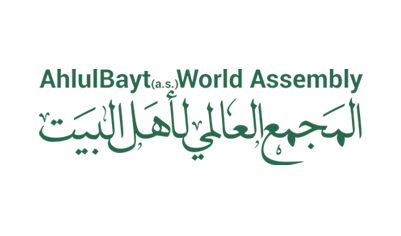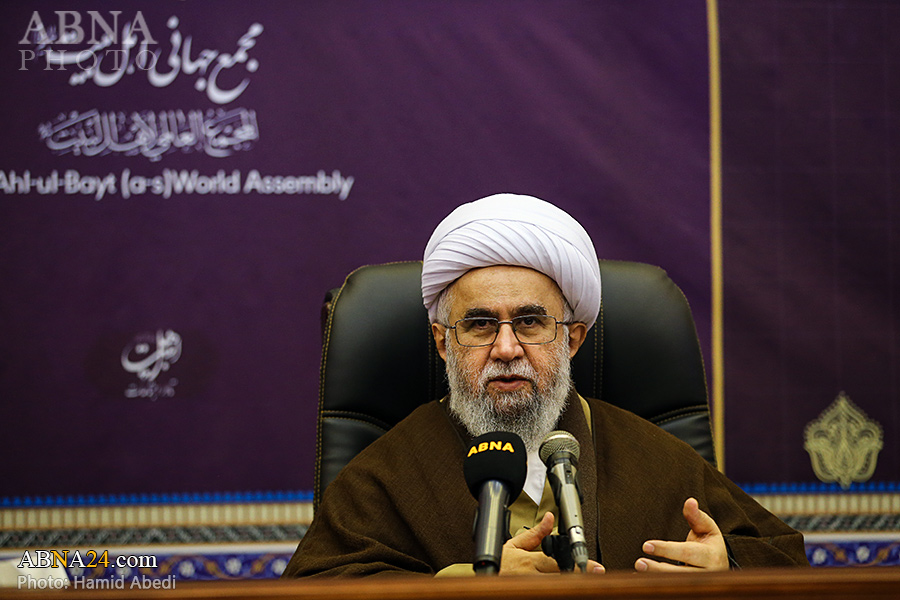With a Faith-Based Perspective in Work, Our Lives Will Progress: Ayatollah Ramazani
The Secretary-General of the AhlulBayt (a.s.) World Assembly emphasized, “We live faithful lives but cannot demonstrate it comprehensively in our collective actions. In other words, only a small portion of faith is reflected in our lives. Therefore, it is necessary to reform our perspectives and approaches.”
According to the official information website of the AhlulBayt (a) World Assembly - On December 19, 2024, the “Official Ethics” session, delivered by Ayatollah Reza Ramazani, Secretary-General of the AhlulBayt (a.s.) World Assembly, was held in the conference hall of the Assembly in Qom, attended by the organization’s managers and staff.
Explaining the principles of Islamic management, Ayatollah Ramazani stated, “Islamic management has four principles: practical, jurisprudential, ethical, and wilayat-based. From the Islamic perspective, wilayat (guardianship) is fundamental, and every type of leadership is accompanied by love and kindness. Additionally, the wilayat of the Prophet (p.b.u.h), the Infallible Imams (a.s.), and the Jurist are within the framework of Allah’s guardianship.”
Emphasizing the necessity of reforming perspectives, he added, “Some people work merely to earn an income and make efforts toward this goal. This approach aligns with materialistic and superficial views. However, in the Islamic system, work should be considered a form of worship.”
Elaborating on the types of worship, the Secretary-General of the AhlulBayt (a.s.) World Assembly explained, “In Islamic teachings and the AhlulBayt (a.s.) guidance, worship is not limited to prayers and fasting. Rather, all individual and social actions of a faithful person can be considered acts of worship. This depends on one’s perspective. If the perspective is comprehensive, and one intends worship, actions such as eating, drinking, listening, speaking, and all deeds can become worship. When a person’s actions become worship, they bring closeness to Allah and draw the person nearer to Him. Therefore, we can perform all our actions with the intention of seeking proximity to Allah, and this perspective is valuable.’
“Martyr Morteza Motahari, in his book on education, wrote, ‘If a person views work correctly, it becomes an act of worship and serves as a tool for education.’ Education has its elements, and working in a collective environment is a significant factor in human development because it teaches collective responsibility,” he continued.
Referring to the views of Ayatollah Khamenei in the book An Outline of Islamic Thought in the Quran, the senior scholar of the Qom Seminary (Dars Kharij Fiqh) noted, “In 1974, the Supreme Leader delivered 28 lectures at the Imam Hasan Mujtaba (a.s.) Mosque in Mashhad, explaining Islamic beliefs based on the Quran. He defines faith comprehensively and argues that faith brings responsibility. It imposes duties on individuals, and there is no faith without responsibility.”
“Faith offers the most comprehensive and sacred responsibility to people,” he continued. “The Supreme Leader states in An Outline of Islamic Thought in the Quran that wilayat has an active role. He also discusses prophethood extensively, noting that the Prophet (p.b.u.h) is a reminder, and the Quran is a remembrance.”
Emphasizing the necessity of a faith-based perspective in work, Ayatollah Ramazani added, “If we adopt a faith-based perspective in our work, our lives will progress. Therefore, we must reflect and examine how much of a faith-based view is present and active in our lives.”
“We must adopt a comprehensive perspective on religion,” he continued. “Some present religion in an isolated way, rather than an interconnected network. However, religion is an integrated and profound system. With his comprehensive perspective, the Supreme Leader believes that Islam provides a framework for life and offers us a plan.”
“The impact and interaction of faith must be evident and active in all our lives. Our faith-based lives are subject to critique because, while we claim to live faithfully, we cannot prove this in our actions as a whole. Only a small portion of our faith manifests in our lives. Hence, reforming our perspectives and approaches is necessary,” stressed the Secretary-General of the AhlulBayt (a.s.) World Assembly.
Regarding some strategies for living faithfully in the workplace, he remarked, “We should not give our own work a perfect score while undervaluing the work of others. Sometimes, this perspective arises from a lack of understanding. Consequently, we make unfaithful critiques, exaggerate our own contributions, and belittle those of others. However, Imam Reza (a.s.) stated, 'Regard others’ work highly and your own work humbly.' Scholars and great personalities did not only refrain from overestimating their own work, but they often considered themselves insignificant.”
The senior scholar of the Qom Seminary said, “Faithful living requires us to see our flaws while overlooking the faults of others. Some people, by faultfinding and highlighting others’ shortcomings, create a negative perception about them. However, Imam Ali (a.s.) advised Malik Ashtar, 'Do not rush to judgment because informants are often deceitful and lack sincerity’.”
Reiterating the importance of strengthening a faith-based perspective, he said, “We must view work as a tool for growth. With this perspective, we can grow in the workplace. True art is in being present in the field and evolving. Therefore, those who are absent from the field cannot make claims about themselves.”
“A true believer understands that faith in Allah and the Hereafter comes with certain requirements that must be fulfilled. Moreover, a faith-based perspective ensures that a person’s life becomes blessed,” Ayatollah Ramazani added.
In his concluding remarks, he stated, “The members and staff of the AhlulBayt (a.s.) World Assembly should consider themselves servants of the AhlulBayt (a.s.). Such a perspective will elevate the quality of their work and instill it with unique characteristics.”
The Secretary-General of the AhlulBayt (a.s.) World Assembly emphasized, “We live faithful lives but cannot demonstrate it comprehensively in our collective actions. In other words, only a small portion of faith is reflected in our lives. Therefore, it is necessary to reform our perspectives and approaches.”
According to the official information website of the AhlulBayt (a) World Assembly - On December 19, 2024, the “Official Ethics” session, delivered by Ayatollah Reza Ramazani, Secretary-General of the AhlulBayt (a.s.) World Assembly, was held in the conference hall of the Assembly in Qom, attended by the organization’s managers and staff.
Explaining the principles of Islamic management, Ayatollah Ramazani stated, “Islamic management has four principles: practical, jurisprudential, ethical, and wilayat-based. From the Islamic perspective, wilayat (guardianship) is fundamental, and every type of leadership is accompanied by love and kindness. Additionally, the wilayat of the Prophet (p.b.u.h), the Infallible Imams (a.s.), and the Jurist are within the framework of Allah’s guardianship.”
Emphasizing the necessity of reforming perspectives, he added, “Some people work merely to earn an income and make efforts toward this goal. This approach aligns with materialistic and superficial views. However, in the Islamic system, work should be considered a form of worship.”
Elaborating on the types of worship, the Secretary-General of the AhlulBayt (a.s.) World Assembly explained, “In Islamic teachings and the AhlulBayt (a.s.) guidance, worship is not limited to prayers and fasting. Rather, all individual and social actions of a faithful person can be considered acts of worship. This depends on one’s perspective. If the perspective is comprehensive, and one intends worship, actions such as eating, drinking, listening, speaking, and all deeds can become worship. When a person’s actions become worship, they bring closeness to Allah and draw the person nearer to Him. Therefore, we can perform all our actions with the intention of seeking proximity to Allah, and this perspective is valuable.’
“Martyr Morteza Motahari, in his book on education, wrote, ‘If a person views work correctly, it becomes an act of worship and serves as a tool for education.’ Education has its elements, and working in a collective environment is a significant factor in human development because it teaches collective responsibility,” he continued.
Referring to the views of Ayatollah Khamenei in the book An Outline of Islamic Thought in the Quran, the senior scholar of the Qom Seminary (Dars Kharij Fiqh) noted, “In 1974, the Supreme Leader delivered 28 lectures at the Imam Hasan Mujtaba (a.s.) Mosque in Mashhad, explaining Islamic beliefs based on the Quran. He defines faith comprehensively and argues that faith brings responsibility. It imposes duties on individuals, and there is no faith without responsibility.”
“Faith offers the most comprehensive and sacred responsibility to people,” he continued. “The Supreme Leader states in An Outline of Islamic Thought in the Quran that wilayat has an active role. He also discusses prophethood extensively, noting that the Prophet (p.b.u.h) is a reminder, and the Quran is a remembrance.”
Emphasizing the necessity of a faith-based perspective in work, Ayatollah Ramazani added, “If we adopt a faith-based perspective in our work, our lives will progress. Therefore, we must reflect and examine how much of a faith-based view is present and active in our lives.”
“We must adopt a comprehensive perspective on religion,” he continued. “Some present religion in an isolated way, rather than an interconnected network. However, religion is an integrated and profound system. With his comprehensive perspective, the Supreme Leader believes that Islam provides a framework for life and offers us a plan.”
“The impact and interaction of faith must be evident and active in all our lives. Our faith-based lives are subject to critique because, while we claim to live faithfully, we cannot prove this in our actions as a whole. Only a small portion of our faith manifests in our lives. Hence, reforming our perspectives and approaches is necessary,” stressed the Secretary-General of the AhlulBayt (a.s.) World Assembly.
Regarding some strategies for living faithfully in the workplace, he remarked, “We should not give our own work a perfect score while undervaluing the work of others. Sometimes, this perspective arises from a lack of understanding. Consequently, we make unfaithful critiques, exaggerate our own contributions, and belittle those of others. However, Imam Reza (a.s.) stated, 'Regard others’ work highly and your own work humbly.' Scholars and great personalities did not only refrain from overestimating their own work, but they often considered themselves insignificant.”
The senior scholar of the Qom Seminary said, “Faithful living requires us to see our flaws while overlooking the faults of others. Some people, by faultfinding and highlighting others’ shortcomings, create a negative perception about them. However, Imam Ali (a.s.) advised Malik Ashtar, 'Do not rush to judgment because informants are often deceitful and lack sincerity’.”
Reiterating the importance of strengthening a faith-based perspective, he said, “We must view work as a tool for growth. With this perspective, we can grow in the workplace. True art is in being present in the field and evolving. Therefore, those who are absent from the field cannot make claims about themselves.”
“A true believer understands that faith in Allah and the Hereafter comes with certain requirements that must be fulfilled. Moreover, a faith-based perspective ensures that a person’s life becomes blessed,” Ayatollah Ramazani added.
In his concluding remarks, he stated, “The members and staff of the AhlulBayt (a.s.) World Assembly should consider themselves servants of the AhlulBayt (a.s.). Such a perspective will elevate the quality of their work and instill it with unique characteristics.”






